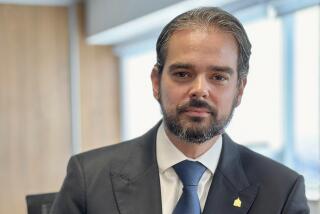Canadian Jurist Named U.N. Rights Chief
- Share via
UNITED NATIONS — Canadian Supreme Court Justice Louise Arbour has been named chief of the United Nations office for human rights, officials at the world body said Friday.
She will replace Sergio Vieira de Mello as high commissioner for human rights. The respected Brazilian envoy was killed Aug. 19 in a bomb attack on the U.N. headquarters in Baghdad.
Arbour, 57, was a top U.N. official in the late 1990s, serving as chief prosecutor for international tribunals dealing with war crimes in the former Yugoslav federation and genocide in Rwanda. She issued indictments against former Yugoslav President Slobodan Milosevic, who is on trial in The Hague.
“It’s one of the most important jobs in the world,” said Reed Brody, special counsel for Human Rights Watch. “Louise Arbour is someone who knows how to get governments to do the right thing and has shown that she’s not afraid of the bad guys.”
Arbour initially turned down an offer to take the post in November, U.N. officials said. But she was later persuaded to leave the Supreme Court seat she has held since 1999 to rejoin the world body.
“The high commissioner for human rights plays a key role on the world scene,” Arbour said in a statement from Australia, where she was attending a legal conference. “I will devote all of my energies to this extraordinary challenge.... It is with sadness that I will abandon the great privilege of being a member of such a remarkable court.”
The U.N. General Assembly must approve the appointment. If it does so, as expected, Arbour will begin work in June.
Arbour was born in Montreal, received her law degree from the University of Montreal and taught at York University’s law school from 1974 until she became an Ontario Supreme Court justice in 1987. She got involved in human rights issues through teaching and her work heading a commission that investigated conditions at women’s prisons in Canada.
Arbour is known as feisty, meticulous and a no-nonsense problem solver. When she joined the war crimes tribunals in 1996, the Rwanda office was in such disarray that she handed over $300 of her own money to fix the photocopiers.
As chief prosecutor, she insisted on sealed indictments for accused war criminals, because public indictments had not hastened their appearance in The Hague but merely helped them evade capture. She fought arguments that indicting Milosevic would impede the Balkan peace process. His arrest, she declared, would signal the end of impunity for war criminals.
The human rights post is sometimes controversial. Arbour is considered an able successor to Vieira de Mello, a charismatic, respected diplomat whose death has left a symbolic void at the U.N. His predecessor from 1997 to 2002, former Irish President Mary Robinson, often drew criticism from American diplomats, who accused her of politicizing the position. Robinson oversaw the 2001 U.N. human rights conference in South Africa, which was largely boycotted by the Bush administration. The U.S. officials deemed the gathering too hostile to Israel.
Arbour has herself faced off with U.S. officials, criticizing what she called their “withdrawal of affection” for the war crimes tribunals when they were unsure whether the proceedings would bolster Washington’s political aims.
She probably will be dealing with such hot-button issues as the U.S. treatment of alleged Taliban and Al Qaeda members being held at Guantanamo Bay, Cuba; Russia’s war with Chechen rebels; and alleged repression of political dissidents in several countries under the guise of fighting terrorism.
“She showed that justice and human rights are constant values that don’t shift with the political sands,” said Brody of Human Rights Watch. “This job requires moral authority to get governments to respond, and she showed that she has that.”
More to Read
Sign up for Essential California
The most important California stories and recommendations in your inbox every morning.
You may occasionally receive promotional content from the Los Angeles Times.












